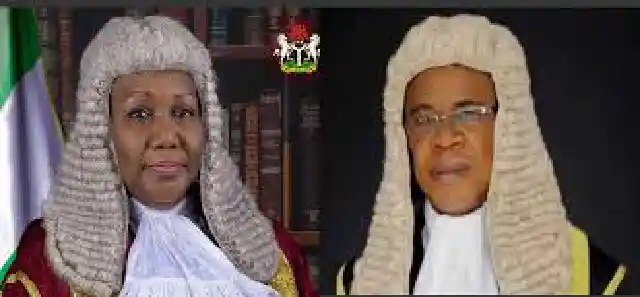
ABUJA, Nigeria — The Chief Judge of the Federal High Court of Nigeria, Justice John Tsoho, has announced the replacement of suspended Justice Inyang Edem Ekwo of the Abuja Division and the redeployment of four other Federal High Court judges across various judicial divisions.
This development, confirmed via an official statement released on Sunday by the Court’s Director of Information, Dr. Catherine Oby Christopher, takes immediate effect.
Also Read : Court Dismisses Philip Shaibu’s ₦50 Billion Rights Suit Against Obaseki
Justice M. G. Umar Takes Over Ekwo’s Court in Abuja
Justice Tsoho assigned Justice M. G. Umar, formerly of the Enugu Judicial Division, to take over Court No. 5 of the Abuja Division, previously presided over by Justice Inyang Ekwo, who was suspended for one year by the National Judicial Council (NJC).
According to the statement, there is no need for litigants or legal counsel to submit fresh applications for case reassignment, as the court has made provisions for automatic continuity of proceedings.
“All matters previously assigned to Justice Ekwo’s court will now be handled by Justice Umar. Counsel and litigants are advised to proceed accordingly without seeking reassignment approvals,” the Chief Judge emphasized.
FULL LIST: Federal High Court Judges Redeployed
In addition to replacing Justice Ekwo, four other judges have been transferred from their current judicial postings to new locations:
- Justice M. G. Umar – from Enugu Division to Abuja Division
- Justice Tijjani Garba Ringim – from Gombe Division to Yola Division
- Justice M. T. Segun-Bello – from Abakaliki Division to Enugu Division
- Justice Bala Khalifa-Mohammed Usman – from Yola Division to Awka Division
- Justice Amina Aliyu Mohammed – from Awka Division to Gombe Division
The redeployment takes immediate effect, and the affected judges are expected to report to their new stations without delay.
Pending Judgements to Be Delivered Promptly
The statement further directed all the affected judges to deliver any pending judgments or rulings in their former divisions within the shortest possible time before fully transitioning to their new postings.
“All judges redeployed must ensure the conclusion and delivery of judgments that are pending in their previous stations as quickly as possible,” the statement read.
This is seen as part of efforts to ensure judicial continuity, prevent backlog, and maintain public confidence in the court system.
No Disruption of Cases in Abakaliki and Katsina Divisions
In divisions currently experiencing judicial gaps, such as Abakaliki and Katsina, Justice Tsoho has issued an interim directive. Resident judges in those divisions are to take over responsibility for all ongoing and new cases until further notice.
This move is aimed at preventing disruption in court operations and ensuring that litigants in those areas do not experience unnecessary delays in the adjudication of their cases.
Why Was Justice Ekwo Suspended?
Justice Inyang Edem Ekwo was recently suspended by the National Judicial Council (NJC) following findings of alleged judicial misconduct. Although the full details have not been officially disclosed, sources within the legal community indicate that the decision followed a series of petitions and disciplinary investigations.
The NJC’s disciplinary committee had recommended his suspension from judicial duties for one year, a move widely viewed as an effort to uphold accountability and ethical standards within the judiciary.
His suspension created a temporary vacuum in the Abuja Division, which Justice Tsoho has now swiftly filled.
Legal Community Reacts
Legal practitioners and stakeholders have largely welcomed the decision of the Chief Judge, describing it as timely and necessary to maintain judicial efficiency.
Barr. Nnenna Okonkwo, a legal analyst based in Abuja, said:
“The Chief Judge’s proactive reassignment ensures that litigants are not left in limbo. Assigning a competent replacement immediately and instructing all affected judges to conclude pending matters is a welcome step.”
Another legal practitioner, Barr. Yusuf Ibrahim, added:
“This type of administrative response builds public confidence in the judiciary. It shows that there is a system in place that works, even when disciplinary measures are taken against erring judges.”
No Need for Case Reassignment Applications
Justice Tsoho reiterated that litigants and counsel do not need to submit any applications to his office for the reassignment of cases previously handled by Justice Ekwo. The newly appointed judge will take over all pending and newly filed matters in Court No. 5, ensuring a seamless transition.
This is particularly significant in a judicial system where case backlogs and procedural delays are common. By clarifying that no action is required from litigants, the Chief Judge has eliminated a potential source of bottleneck.
Ongoing Judicial Reforms and Internal Discipline
The redeployment of five judges comes amid increased scrutiny of Nigeria’s judicial system and ongoing efforts to reform internal administrative practices.
Justice Tsoho, who has served as Chief Judge since 2019, has taken steps to enhance the efficiency and credibility of the Federal High Court, including the timely delivery of judgments, enforcement of ethical codes, and deployment of digital filing systems.
The recent suspension of Justice Ekwo and subsequent redeployments signal that internal disciplinary measures and administrative oversight are being actively enforced.